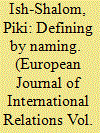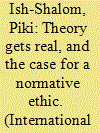|
|
|
Sort Order |
|
|
|
Items / Page
|
|
|
|
|
|
|
| Srl | Item |
| 1 |
ID:
107609


|
|
|
|
|
| Publication |
2011.
|
| Summary/Abstract |
Politics is a public effort directed at the allocation of resources, both material and symbolic. Quite often it involves conflict in the form of a public struggle over the allocation of resources. Informed by Antonio Gramsci's theory of hegemony, this article offers a political reading of constructivism (a theoretical perspective here called Political Constructivism). It maintains that politics is guided by a conscious effort by political agents to control the commonsensical understanding of social reality using the media of political concepts, metaphors, symbols, and - the focus of this article - names and definitions. Political agents regard controlling the commonsense as one of the most effective political tools. They understand that it can be controlled by attaching meanings to political concepts, by linking metaphors and symbols to ideas, and by linking events to classes of events through naming and defining. This article examines the civic warring in Israel over the defining and naming of the Second Lebanon War as a case in point. Defining and naming the event involved a political struggle to frame the commonsense, gain the upper hand in the political process of constructing socio-political reality, and reap the political gains. The article argues that the political struggle was resolved by what I call a weak Kripkean-like defining, in other words, defining by naming.
|
|
|
|
|
|
|
|
|
|
|
|
|
|
|
|
| 2 |
ID:
090675


|
|
|
|
|
| Publication |
2009.
|
| Summary/Abstract |
What are social science theorists' responsibilities for the effects of their theories in the real world? I maintain that politicians and ideologues place theories in their political agendas without necessarily heeding their actual content. Hence, the ramifications of theories in the real world are mostly the result of political uses and, at times, political abuses. Consequently, theorists cannot be held morally responsible for these. They do, however, bear the obligation to examine if there are some intrinsic features of theorization and theory that render these susceptible to public misinterpretation and vulnerable to political abuse. Pointing to the rhetorical capital inherent in theories, and supported by examples involving democratic-peace theory and its political destinies, I conclude that, to discharge this task, social science theorists should substitute the prevailing objective ethic with a normative one.
|
|
|
|
|
|
|
|
|
|
|
|
|
|
|
|
| 3 |
ID:
074824


|
|
|
|
|
| Publication |
2006.
|
| Summary/Abstract |
This paper looks at the complex relationship that exists between ideology, international relations theories, and the world of practice. It focuses on the role of theoretical concepts in forming foreign policy, asks whether theoreticians and theories act as agents in the political arena, and if so, what the consequences of this agency are. The paper attempts to show that theoretical concepts have a political role to play in the field of foreign affairs, and that to some degree they shape the reality that they try to study. As such, they blur the dichotomist distinction between subject and object, and should not be considered outside observers, which is a necessary precondition to objectivity. This agency and lack of objectivity, I claim, endow theoreticians with moral responsibility, and obligate the founding of research on morality. In order to demonstrate my claims I focus on U.S. foreign policy toward Latin America under the Kennedy administration, the influence of Walt W. Rostow regarding that policy, and what can be termed the rise and fall of modernization theory.
|
|
|
|
|
|
|
|
|
|
|
|
|
|
|
|
| 4 |
ID:
105936


|
|
|
|
|
| Publication |
2011.
|
| Summary/Abstract |
With reference to Martin Buber's dialogical philosophy, the article identifies three dialogic imperatives that burden IR scholars. The first imperative is internal to the scholar. It is the intrapersonal imperative to conduct a dialogue with and in herself/himself. The second dialogic imperative is the interpersonal dialogue, which helps to establish a community of scholars. The third dialogic imperative is external to the community of scholars. It is the obligation to dialogically engage with the public to which the scholars belong. It will be shown that the third dialogic imperative is also a dialogic imperative to engage with truth about the public, that is, with social reality. I will end the article with a brief discussion on the Buberian dialogue within the context of the Israeli-Palestinian conflict.
|
|
|
|
|
|
|
|
|
|
|
|
|
|
|
|
| 5 |
ID:
075369


|
|
|
|
|
| Publication |
2006.
|
| Summary/Abstract |
This essay examines the interconnectedness among realism, elitism, and conservatism, claiming that realism cannot be understood in isolation from conservative skepticism regarding human nature and the possibility of change. Just as conservatism constitutes the foundation of realism, so it also constitutes the foundation of elitist and structural theories of democracy, thereby establishing an inherent interconnection among the three. Such interconnectedness lies at the root of the antagonism that realists display toward policies that aim to promote democracy. Contrary to the common wisdom among international relations scholars, it also implies a strong link between international relations and political science. Moreover, this interconnectedness discredits the positivist philosophy of the social sciences, calling instead for a normative philosophy of the social sciences.
|
|
|
|
|
|
|
|
|
|
|
|
|
|
|
|
|
|
|
|
|